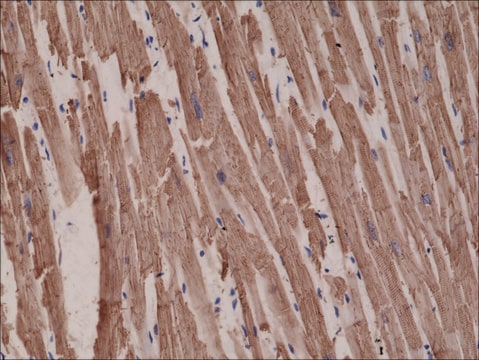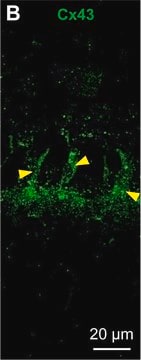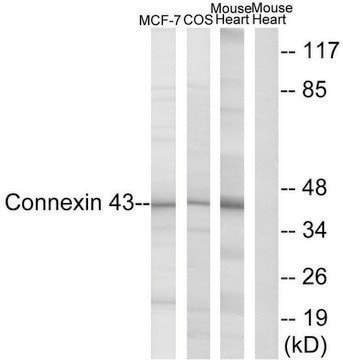A9357
Anti-alpha-Actin Antibody, Cardiac Muscle (ACTC1) Antibody
mouse monoclonal, AC1-20.4.2
Sinonimo/i:
Anti-ACTC, Anti-ACTC1, Anti-Actin alpha cardiac muscle 1, Anti-CMD1R, Anti-CMH11
Scegli un formato
Scegli un formato
About This Item
Prodotti consigliati
Nome del prodotto
Anti-Actin, Cardiac antibody, Mouse monoclonal, clone AC1-20.4.2, purified from hybridoma cell culture
Origine biologica
mouse
Livello qualitativo
Coniugato
unconjugated
Forma dell’anticorpo
purified immunoglobulin
Tipo di anticorpo
primary antibodies
Clone
AC1-20.4.2, monoclonal
Stato
buffered aqueous solution
PM
antigen ~42 kDa
Reattività contro le specie
rat, human, bovine, chicken, mouse
Concentrazione
~1.0 mg/mL
tecniche
immunocytochemistry: suitable
immunohistochemistry (formalin-fixed, paraffin-embedded sections): 10-20 μg/mL using digested rat heart tissue
indirect ELISA: suitable
western blot: suitable
Isotipo
IgG1
N° accesso UniProt
Condizioni di spedizione
dry ice
Temperatura di conservazione
−20°C
modifica post-traduzionali bersaglio
unmodified
Informazioni sul gene
human ... ACTC1(70)
mouse ... Actc1(11464)
rat ... Actc1(29275)
Descrizione generale
Immunogeno
Applicazioni
Immunohistochemistry (1 paper)
Western Blotting (1 paper)
Stato fisico
Esclusione di responsabilità
Non trovi il prodotto giusto?
Prova il nostro Motore di ricerca dei prodotti.
Codice della classe di stoccaggio
10 - Combustible liquids
Punto d’infiammabilità (°F)
Not applicable
Punto d’infiammabilità (°C)
Not applicable
Dispositivi di protezione individuale
Eyeshields, Gloves, multi-purpose combination respirator cartridge (US)
Scegli una delle versioni più recenti:
Certificati d'analisi (COA)
Non trovi la versione di tuo interesse?
Se hai bisogno di una versione specifica, puoi cercare il certificato tramite il numero di lotto.
Possiedi già questo prodotto?
I documenti relativi ai prodotti acquistati recentemente sono disponibili nell’Archivio dei documenti.
Active Filters
Il team dei nostri ricercatori vanta grande esperienza in tutte le aree della ricerca quali Life Science, scienza dei materiali, sintesi chimica, cromatografia, discipline analitiche, ecc..
Contatta l'Assistenza Tecnica.








